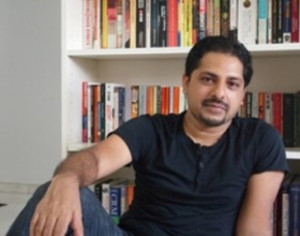Zafar Anjum is a writer, publisher and a filmmaker who lives and works in Singapore. He has been published in India, the US, the UK, Singapore and other countries. His most recent works include Kafka in Ayodhya and Other Short Stories (Kitaab, 2015), Startup Capitals : Discovering the Global Hotspots of Innovation (Random House India, December 2014), Iqbal: The Life of a Poet, Philosopher and Politician (Vintage Books/Random House India, 2014), The Resurgence of Satyam (Random House India, 2012), and The Singapore Decalogue: Episodes in the Life of a Foreign Talent (Red Wheelbarrow Books, 2012). He also blogs, mentors budding writers and is the editor of Kitaab.org, a literary website. ZafarAnjum is represented by the Jacaranda Literary Agency.
Zafar, welcome to a candid chat with me, Deeba
These are all labels. The idea is to explore different aspects of one’s personality or selfhood. If you look closely, writing is at the root of all these creative endeavours, so I would say it is writing that is my fundamental calling. In all honesty, I am still a newbie as a filmmaker and publisher.
I like all my books, but having written them and gotten them published, I find them incomplete or lacking in certain aspects. So, I am yet to have a personal favourite. As of now, I think the stories in Kafka in Ayodhya are not too bad. Maybe my favourite will be a future work. I sincerely hope so.
I have not dabbled in self-publishing as such. However, you can say that my first book, which was a novel, was kind of self-published, even though a friend bankrolled the production and another helped with the printing process (and he was a publisher in his own right). My only advise to writers is that you need a lot of talent, good luck and patience to find a suitable publisher for your work. Self-publishing works if it is meant for a niche audience, or if you want to test out an audience. Today, many self-published writers are finding great monetary success, and huge fan following. The Guardian newspaper gives awards to the best self-published books. So, the stigma attached to self-publishing is slowly going away. However, if you really crave for critical success, you still need a mainstream publisher.
I have been researching to write a book on smart cities. There are some other projects too but it is too early to talk about them. At this point of time, I am far more excited about the books that I am doing as a publisher. I want to publish really important or charming books, and I want to see my writers succeed and find their readers.
I am generally always writing—mostly for technology publications. On the creative side, I always think in terms of books and projects. Earlier I used to be very instinctive about my writing. I would do blogs, I would commentaries for newspapers, or I would do guest articles if people invited me to write. Not any more. Nowadays, I write only when I know what book I am working on. It is a very measured and to-the-point kind of writing nowadays.
If you talk about writing literary pieces, I write when I am moved by something—an event, an incident, a thought. Usually, I write when I want to make a point. Else, I write to pay the bills.
I don’t believe in writer’s block. Reading keeps your mind and soul stimulated.
I became a publisher to support projects that mainstream publishers would generally ignore. The reigning logic in the publishing business, like any other business, is return on investment. Capital is chasing books and authors who can promise good returns. While this makes good business sense, it is not necessarily helpful to writers, especially new writers, who don’t want to write whatever is selling at the moment. Kitaab supports Asian writers and Asian writing in English. We are looking at translation projects too. We want to work with both new and seasoned writers. We are looking for exciting work that has literary merit in it. To help writer self-publish, we are starting a new imprint that will be announced soon.
While writing a novel, you are your own master. You follow your own vision. That freedom might not be there in writing a screenplay. Filmmaking is a collaborative process, and the collaboration starts right at the scripting stage. While writing a script, you have to keep the film’s budget in mind and devise scenes that will adhere to the limits of the given budget. In fiction writing, you have the complete freedom to explore your creative limits. You don’t have any walls to fight against. You create your own walls, your own boundaries.
Cappuccino when I am outside. Avocado shake when I am at home.
Having your own creative space is great, but it does not matter if you don’t have one. For a lot of writers it is a luxury anyway. Write wherever you can and whenever you can. Stay honest to yourself and be disciplined when it comes to writing. I know it is easier said than done but that is the price a career in writing exacts from you.
______________________________________________________________________________
If you want to know more about our guest, please visit their website below:
Website: zafaranjum.com
Website: kitaab.org
